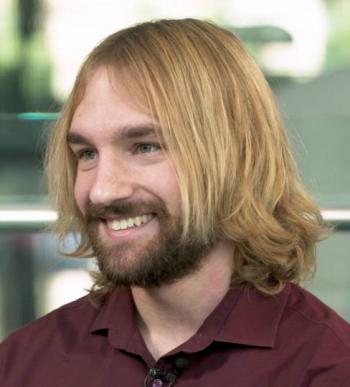
Georgios Moschidis is one of four winners of this year’s Porter Ogden Jacobus Fellowship, Princeton University’s top honor for graduate students, along with Chantal Berman, Cole Bunzel and Matthew Edwards.
The fellowships support the students’ final year of study at Princeton and are awarded to one Ph.D. student in each of the four divisions (humanities, social sciences, natural sciences and engineering) whose work has exhibited the highest scholarly excellence. The Jacobus Fellows were honored at Alumni Day ceremonies Saturday, Feb. 24.
Moschidis, a doctoral student in mathematics who came to Princeton in 2013, earned a Bachelor of Science in mathematics from the National Technical University of Athens in Greece. He was a visiting student at the Department of Pure Mathematics and Mathematical Statistics at the University of Cambridge in 2016-17.
As part of his dissertation work that he discusses in the video above, he resolved two well-known open conjectures in classical general relativity, the theory of gravity formulated by Albert Einstein in 1915.
His dissertation, “Stability and instability results in general relativity,” provides the first rigorous proof of the instability of Anti-de Sitter (AdS) spacetime in the presence of matter. “While the instability of AdS spacetime in the absence of matter remains a challenging open problem, the ideas and techniques developed as part of my dissertation render this conjecture more tractable,” he said. “Hence, I am confident that, in the forthcoming years, I will be able to make significant progress towards establishing the AdS instability conjecture.”
Moschidis was awarded a Stanley J. Seeger Fellowship from the Seeger Center for Hellenic Studies and also received the Thomaideio Prize from 2009-13 at National Technical University of Athens.
Moschidis’ adviser, Mihalis Dafermos, a professor of mathematics, said Moschidis’ proof is “ingenious” and that its publication this year will be “very influential for future developments in the mathematics of general relativity.”
“I find this result to be perhaps the most original mathematical development I have seen in general relativity in recent years,” Dafermos added.
By Denise Valenti, Office of Communications